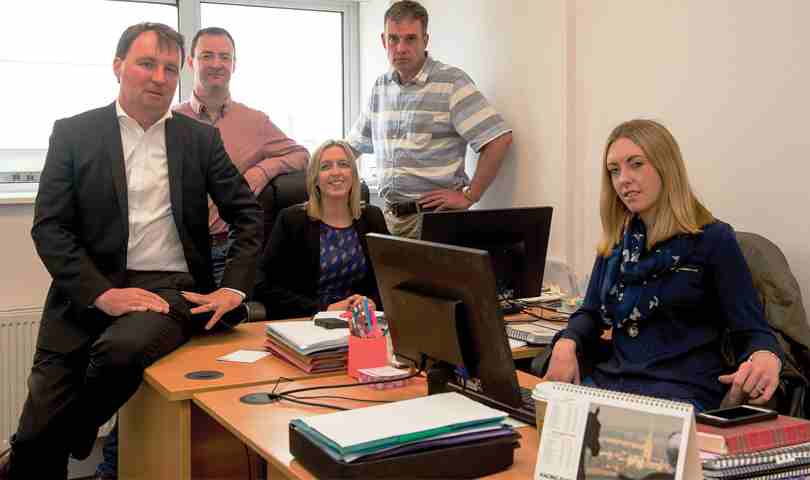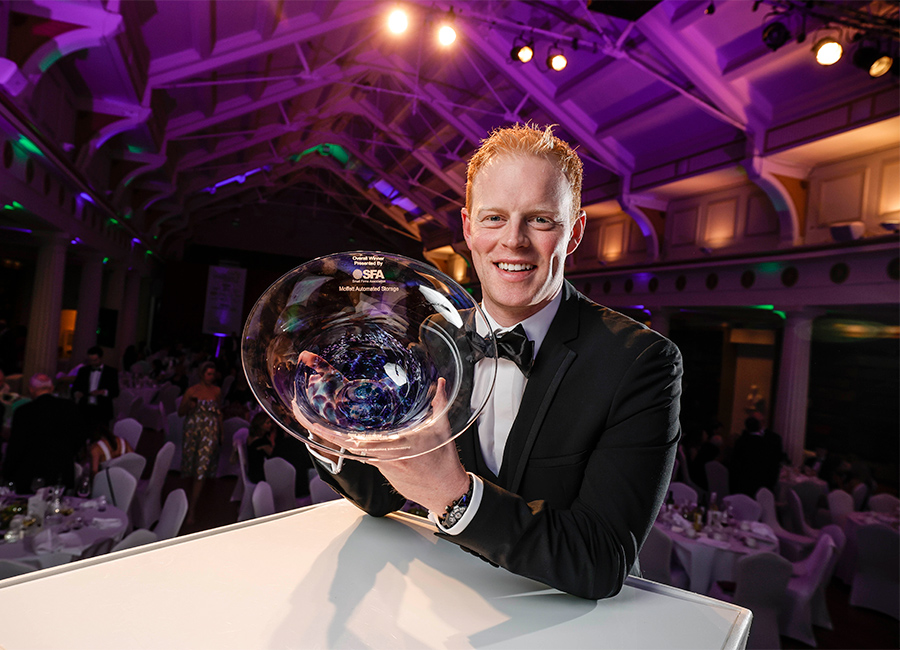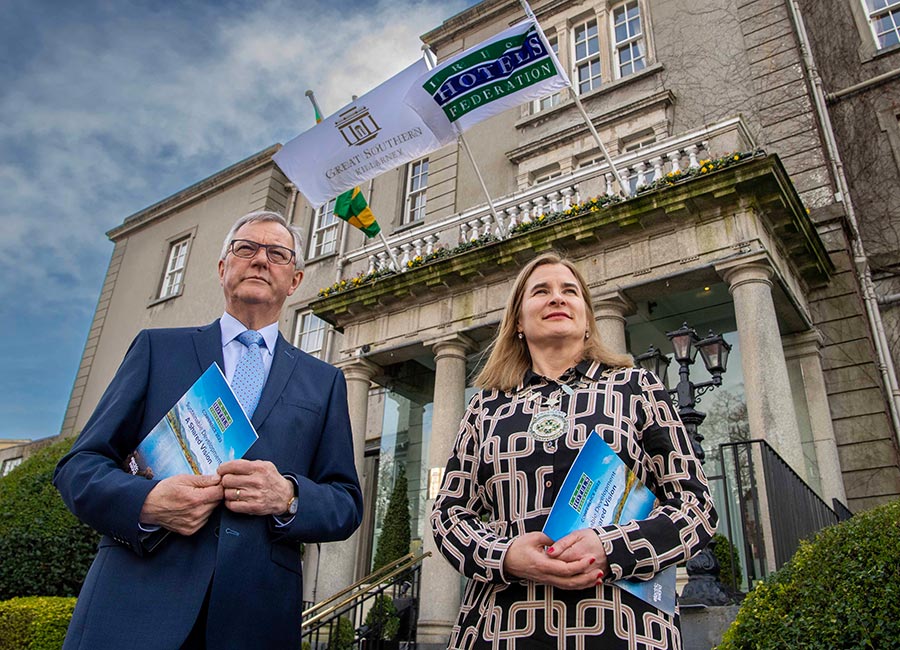After ten years as sales and marketing director for Punchestown Racecourse, Liam Holton fancied a flutter on a business of his own. His startup, Future Ticketing, sticks to a course that’s familiar to Holton, based as it is around ticket management. Launched last year, Future Ticketing has developed cloud-based software that helps businesses to easily manage digital ticketing and payment processing.
The software is free for companies to install and integrates with payment platforms such as Stripe and Realex. It can also handle mobile ticketing and can be installed directly onto websites and social media platforms. In the shadows of well-established ticketing service providers such as Eventbrite and Ticketmaster, Holton’s horse has long odds but has started well – among its 25 or so customers are Punchestown and Limerick racecourses, as well as Euro Car Parks and The Sunday Business Post.
Holton left his post at Punchestown in 2014 and now works full-time with Future Ticketing as chief executive. His partners in the venture are Emelyn Murray, chief operating officer, and Mark Cotter, who are also directors of Vuepoint, a print, web and design business. Future Ticketing is based in Tullamore and employs five people.
When did the entrepreneurial bug first bite?
I earned my first wage packet at the age of eight and even then I knew I wanted to run my own show. When I lived in Milan in the mid-1990s, I got my first opportunity to run my own business and had a very successful few years until I decided to move home. When I returned to Ireland a mixture of family, the economy and some nice jobs meant my entrepreneurial spirit went on the back burner for a few years. I still kept looking at projects and got involved in a couple of startups.
How did the Future Ticketing idea arise?
From working in the general ticketing area and having spent most of my career working to create and maintain customers, I was struck by two glaring problems. I could not understand why a ticket seller would hand over the marketing experience of their customer, whom they had worked so hard to acquire, to a third party.
Secondly, the technology being used widely was cumbersome, time consuming and inefficient. Future Ticketing was developed to meet those two primary needs: to provide a smart, fast and digitally enabled ticketing solutions, and to enable a promoter, event or venue not only sell directly to their customers but also to engage with those customers on a more meaningful level.
How much planning went into the startup?
Our first public event was in April 2014 and we’ve spent the last 16 months trialling and perfecting our technology to ensure we understand completely the needs of the market. We are confident that we have a range of technology solutions in place that satisfy the market needs, and with my full-time involvement now as CEO and a strong team in place, we are now in a positon to really grow the business. The system is modular, it is very flexible and it’s easy for us to add new features and benefits as required. This is a significant differentiator for Future Ticketing.
What’s your strategy for securing clients?
Up to now, we have used a personal selling approach, targeting industry leaders and innovators to create showcases that prove our proposition in different sectors and market segments. We have recently automated our sales processes and our product can now be bought and delivered entirely over the internet. This means we can acquire customers anywhere in the globe from our headquarters in Ireland.
What sort of price plan do you operate?
From over 20 years of experience in business, I am a fundamental believer in a partnership approach with our customers. Our software is free to install and use, and we provide training and account management free of charge. Our income comes from a percentage of revenue generated by our software in ticket sales. We believe our high-tech, low-cost model enables us to be more competitive than current suppliers. We also operate off a licencing fee arrangement with larger customers.
Is Future Ticketing operating in overseas markets?
So far we have done a dozen events in the UK, where our biggest client is Musketeer Event Management, who are leaders in the equestrian events market. Our technology and business model was designed to be fully scalable, so while Ireland is an excellent test market our plans are to expand internationally quite quickly.
How do you plan to compete with Ticketmaster and Eventbrite?
The traditional dominance of Ticketmaster has helped create the opportunity for us, as it has deterred investment and innovation in the ticketing market for years. In fact, at the moment only a small percentage of the total ticket market is serviced.
I have a lot of respect for Ticketmaster’s commercial acumen and they have some excellent people in their organisation but they are using dated, expensive and cumbersome technology. With a valuation of over €1bn after their latest funding round, Eventbrite is certainly interesting. They provide a very good solution for free or once-off events where organisers don’t expect plan to retain the customer for future events.
We’ve competed with both Ticketmaster and Eventbrite for a couple of events and we’ve won the business, but in general we offer a very different customer proposition than either company. We believe there is a market out there for businesses who value the customer too much to hand control over to a middleman and outsource their brand in the process. So we are happy we have enough differentiation to established solutions to build up a business of scale.
What do you see as Future Ticketing’s biggest challenges?
Like most businesses in the early years, Future Ticketing needs time and money. Our system is designed to speak over 200 languages, but we need time to build the right team, processes and brand, and we need investment to ensure we have the right people, strategies and marketing to internationalise the business.
How did you fund Future Ticketing?
So far we have funded the business from our own resources and customer revenues. The Local Enterprise Office in Offaly has been excellent and helped us with expertise, employment grants and offices in their innovation hub.
Was finding the right location to set up a challenge?
Tullamore has proven to be the ideal location. Geographically, we are easily accessible to anywhere in Ireland and Dublin airport is only an hour away. Our offices are in the local enterprise hub, which has all the facilities we require and most importantly there is a great pool of high-quality staff available at a lower cost base than other parts of Ireland. I’d encourage anybody starting a business to look at the midlands as a hub location.
What can the government do to best help startups like yours?
I firmly believe that government should stay out of the way of business. We have a public service obsessed by unnecessary regulation. They really need to go back to running schools and hospitals and leave business to business people. That said, a reduction in the rate of CGT and an expansion of corporation tax relief for startup companies in the budget would be a help.
What’s the best piece of business advice you’ve been given?
Michael O’Leary told me once the only reason people buy tickets today for something in the future is if the ticket will be more expensive tomorrow or won’t be there tomorrow. This was one of the mantras when designing the promotional element of our software. Hopefully some of our customers can be as successful as he has been selling online.











